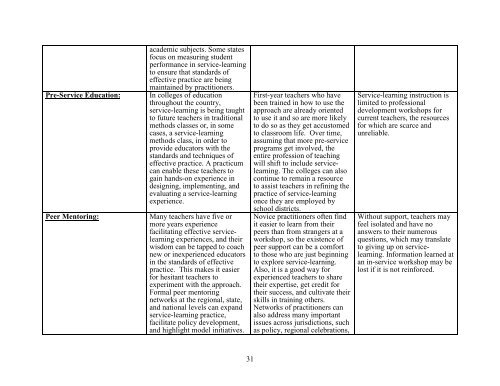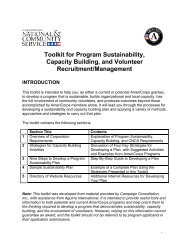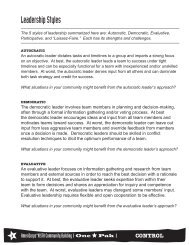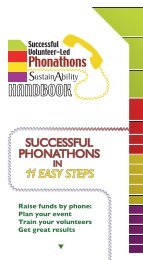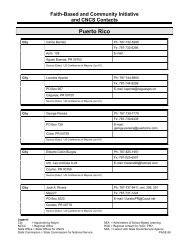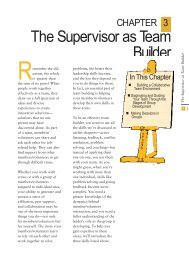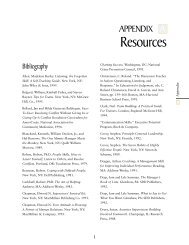MAKE IT LAST FOREVER: THE ... - National Service Resource Center
MAKE IT LAST FOREVER: THE ... - National Service Resource Center
MAKE IT LAST FOREVER: THE ... - National Service Resource Center
You also want an ePaper? Increase the reach of your titles
YUMPU automatically turns print PDFs into web optimized ePapers that Google loves.
academic subjects. Some states<br />
focus on measuring student<br />
performance in service-learning<br />
to ensure that standards of<br />
effective practice are being<br />
maintained by practitioners.<br />
Pre-<strong>Service</strong> Education: In colleges of education<br />
throughout the country,<br />
service-learning is being taught<br />
to future teachers in traditional<br />
methods classes or, in some<br />
cases, a service-learning<br />
methods class, in order to<br />
provide educators with the<br />
standards and techniques of<br />
effective practice. A practicum<br />
can enable these teachers to<br />
gain hands-on experience in<br />
designing, implementing, and<br />
evaluating a service-learning<br />
experience.<br />
Peer Mentoring: Many teachers have five or<br />
more years experience<br />
facilitating effective servicelearning<br />
experiences, and their<br />
wisdom can be tapped to coach<br />
new or inexperienced educators<br />
in the standards of effective<br />
practice. This makes it easier<br />
for hesitant teachers to<br />
experiment with the approach.<br />
Formal peer mentoring<br />
networks at the regional, state,<br />
and national levels can expand<br />
service-learning practice,<br />
facilitate policy development,<br />
and highlight model initiatives.<br />
31<br />
First-year teachers who have<br />
been trained in how to use the<br />
approach are already oriented<br />
to use it and so are more likely<br />
to do so as they get accustomed<br />
to classroom life. Over time,<br />
assuming that more pre-service<br />
programs get involved, the<br />
entire profession of teaching<br />
will shift to include servicelearning.<br />
The colleges can also<br />
continue to remain a resource<br />
to assist teachers in refining the<br />
practice of service-learning<br />
once they are employed by<br />
school districts.<br />
Novice practitioners often find<br />
it easier to learn from their<br />
peers than from strangers at a<br />
workshop, so the existence of<br />
peer support can be a comfort<br />
to those who are just beginning<br />
to explore service-learning.<br />
Also, it is a good way for<br />
experienced teachers to share<br />
their expertise, get credit for<br />
their success, and cultivate their<br />
skills in training others.<br />
Networks of practitioners can<br />
also address many important<br />
issues across jurisdictions, such<br />
as policy, regional celebrations,<br />
<strong>Service</strong>-learning instruction is<br />
limited to professional<br />
development workshops for<br />
current teachers, the resources<br />
for which are scarce and<br />
unreliable.<br />
Without support, teachers may<br />
feel isolated and have no<br />
answers to their numerous<br />
questions, which may translate<br />
to giving up on servicelearning.<br />
Information learned at<br />
an in-service workshop may be<br />
lost if it is not reinforced.


